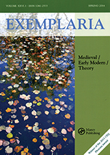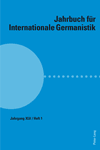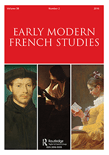
DAPHNIS-ZEITSCHRIFT FUR MITTLERE DEUTSCHE LITERATUR
Scope & Guideline
Exploring the Depths of Middle German Literature
Introduction
Aims and Scopes
- Interdisciplinary Literary Studies:
The journal emphasizes an interdisciplinary approach, merging literary analysis with history, cultural studies, and philosophy to provide a comprehensive understanding of Middle German literature. - Focus on Early Modern Literature:
DAPHNIS primarily concentrates on literature from the early modern period, addressing the societal and cultural influences that shaped literary works during this time. - Thematic Exploration of Sociability:
A significant focus is placed on the concept of sociability, exploring how literature reflects social practices, norms, and relationships among individuals and communities. - Critical Editions and Textual Studies:
The journal contributes to the field through critical editions of texts and in-depth textual studies, ensuring the preservation and scholarly engagement with historical works. - Gender and Cultural Representation:
It addresses themes of gender and cultural representation, investigating how women writers and other marginalized voices contribute to the literary landscape of the early modern period.
Trending and Emerging
- Exploration of Emotional and Affective Dimensions:
There is an increasing emphasis on the emotional and affective dimensions of literature, examining how feelings and social behaviors are portrayed in early modern texts. - Cultural Transfer and Exchange:
The journal has begun to explore themes of cultural transfer, looking at how literature interacts with various social and cultural contexts across regions and time periods. - Critical Engagement with Gender Issues:
Emerging discussions on gender issues, especially regarding female authors and their contributions to the literary canon, have gained traction. This reflects a broader interest in feminist literary criticism. - Socio-Political Contextualization:
Recent articles have started to contextualize literary works within their socio-political environments, highlighting how literature responds to and critiques contemporary issues. - Interdisciplinary Approaches to Memory and History:
The journal shows a significant trend towards interdisciplinary studies that connect literature with memory, history, and epistemology, indicating a holistic approach to understanding texts.
Declining or Waning
- Nostalgic Literary Criticism:
There appears to be a waning interest in purely nostalgic or romanticized literary criticism that lacks critical engagement with modern contexts or interpretations. - Overemphasis on Canonical Texts:
The journal has seen a decrease in articles focused exclusively on canonical texts, indicating a shift towards a more inclusive exploration of lesser-known works and authors. - Traditional Historical Narratives:
Research that strictly adheres to traditional historical narratives has become less frequent, suggesting a movement towards more innovative and interdisciplinary methodologies.
Similar Journals

AKZENTE-ZEITSCHRIFT FUR LITERATUR
Celebrating the Richness of Literary TraditionAKZENTE-ZEITSCHRIFT FUR LITERATUR is a distinguished journal in the field of literature and literary theory, published by Carl Hanser Verlag, a revered name in German publishing. Operating from Germany, the journal has contributed significantly to literary discourse since its inception. With an ISSN of 0002-3957, AKZENTE has established itself within the scholarly community, despite its coverage in Scopus being discontinued since 2020. It currently holds a Q3 quartile ranking in Literature and Literary Theory for 2023, reflecting a solid position among its peers. Although classified as non-open access, the journal serves as a vital platform for researchers, professionals, and students interested in deepening their understanding of literary analysis and theory. The thoughtful selection of scholarly articles and critical essays featured in AKZENTE not only fosters intellectual exchange but also promotes the exploration of contemporary and historical literary topics, making it an essential resource for those dedicated to the study of literature.

Exemplaria-Medieval Early Modern Theory
Pioneering New Perspectives in Literature and TheoryExemplaria: Medieval Early Modern Theory is a distinguished journal within the fields of Cultural Studies, Linguistics and Language, and Literature and Literary Theory, published by Routledge Journals, Taylor & Francis Ltd. With an impressive Q1 ranking in Literature and Literary Theory and notable placements in associated disciplines, this journal serves as an essential platform for scholars dedicated to exploring the complexities of medieval and early modern texts and contexts. Established with a vision to stimulate interdisciplinary dialogue, Exemplaria has evolved from its initial years (1989-1995) to a renewed focus (2002-2024), consistently fostering significant contributions that shape contemporary literary discourse. Although currently not open access, the journal ensures broad reach and engagement through its meticulously curated articles, reviews, and critical essays that challenge traditional narratives and advocate for innovative methodologies. With the journal's ISSN 1041-2573 and E-ISSN 1753-3074, researchers, professionals, and students interested in advancing their understanding of literary traditions are encouraged to explore its rich repository of knowledge, which reflects the dynamic interplay between historical texts and modern interpretations.

JAHRBUCH FUR INTERNATIONALE GERMANISTIK
Unlocking New Perspectives in German Literary TheoryJAHRBUCH FUR INTERNATIONALE GERMANISTIK is a prominent academic journal published by VERLAG PETER LANG AG, dedicated to advancing research in the fields of German studies, literature, and linguistics. With its ISSN 0449-5233 and E-ISSN 2235-1280, this journal provides a platform for scholarly discourse, critical analysis, and innovative studies related to German language and literary theory. Although its coverage in Scopus was discontinued in 2014, the journal continues to be influential within the academic community, evidenced by its rankings in the Arts and Humanities and Social Sciences categories. Specifically, it holds a rank of #397 in Literature and Literary Theory and #477 in Language and Linguistics, reflecting a solid presence among peers. Researchers and students alike can benefit from its insightful articles that delve into various dimensions of Germanistik, thereby fostering a greater understanding of language and cultural contexts. For those interested in contributing to this field of study, JAHRBUCH FUR INTERNATIONALE GERMANISTIK serves as an essential resource for high-quality scholarly content.

LINKS Rivista di letteratura e cultura tedesca
Unveiling New Perspectives in German Literary StudiesLINKS Rivista di letteratura e cultura tedesca is a distinguished academic journal dedicated to the exploration and analysis of German literature and culture. Published by FABRIZIO SERRA EDITORE, this journal serves as a vital platform for researchers, professionals, and students who wish to delve into the intricacies of German cultural studies across various time periods and genres. With both ISSN 1594-5359 and E-ISSN 1724-1685, LINKS emphasizes scholarly rigor and multidisciplinary approaches, providing a space for innovative research and critical perspectives. Although the journal is not open access, it still plays a crucial role in advancing the understanding of German literature within the international academic community, contributing significantly to the field's ongoing dialogue and evolution. For those interested in enhancing their knowledge and engagement with contemporary issues in German studies, LINKS represents an essential resource.

ARCHIV FUR DAS STUDIUM DER NEUEREN SPRACHEN UND LITERATUREN
Celebrating the Intersections of Language and Literary ArtARCHIV FUR DAS STUDIUM DER NEUEREN SPRACHEN UND LITERATUREN is a distinguished journal published by Erich Schmidt Verlag, dedicated to the exploration of modern languages and literatures. With an ISSN of 0003-8970 and E-ISSN 1866-5381, this journal serves as a crucial platform for scholars interested in the nuanced intersections of language studies and literary analysis. Although the journal's coverage in Scopus has been discontinued, its contributions remain significant, having ranked within the 25th and 12th percentiles in respective categories of literature, linguistics, and social sciences. Positioned in Berlin, Germany, the journal embraces a diverse international readership, presenting innovative research, critical essays, and reviews that foster deeper understanding and appreciation of linguistic and literary developments. The journal’s rigorous peer-review process and commitment to scholarly excellence make it an essential resource for researchers, professionals, and students alike, aiming to advance their knowledge in the field.

Early Modern French Studies
Engaging with the Past to Inspire Future ScholarshipEarly Modern French Studies (ISSN: 2056-3035; E-ISSN: 2056-3043), published by Routledge Journals, Taylor & Francis Ltd, is an essential academic journal that delves into the complexities of early modern French culture, literature, and history. With a focus on interdisciplinary approaches, this journal offers scholars a platform to engage with the evolving dynamics of French studies from 2015 to 2024. Despite its current Q4 ranking in the categories of Cultural Studies, History, and Literature and Literary Theory, Early Modern French Studies seeks to elevate discussions and research that illuminate the richness of the early modern period. While offering traditional subscription options, the journal encourages submissions that challenge prevailing narratives and foster innovative dialogues within the field. This journal is crucial for anyone looking to contribute to or gain insights into the intricate tapestry of early modern French scholarship.

TEXTUAL PRACTICE
Advancing Critical Thought in Literary StudiesTEXTUAL PRACTICE, published by Routledge Journals, Taylor & Francis Ltd, stands as a leading peer-reviewed journal in the field of Literature and Literary Theory, contributing significantly to scholarly dialogue since its inception in 1987. With an impressive 2023 Scopus ranking placing it in the top 88th percentile, the journal holds a coveted Q1 category designation, underscoring its impact and relevance in contemporary literary studies. While it operates under a traditional access model, TEXTUAL PRACTICE continues to foster a vibrant platform for academics, offering in-depth analyses, innovative research, and critical discourse that shape the understanding of texts and their cultural implications. Situated in the United Kingdom, this journal is pivotal for researchers, professionals, and students committed to exploring the multifaceted dimensions of literature and its theories, thereby enhancing the intellectual landscape of the humanities.

NEUE RUNDSCHAU
Advancing Critical Discourse in the ArtsNEUE RUNDSCHAU is a prominent journal published by S Fischer Verlag GmbH, specializing in the fields of literature and literary theory, as well as visual arts and performing arts. With its roots tracing back to its inception in 1969, this journal has evolved significantly, providing a platform for critical discourse and innovative scholarship in the arts and humanities. Although it experienced coverage changes, the journal remains a vital resource for researchers and academics, contributing to the rich dialogue surrounding cultural studies and artistic expression. Furthermore, while it is not available through open access, NEUE RUNDSCHAU offers essential insights into contemporary literary trends and artistic movements, ensuring its relevance and importance within the academic sphere. With Scopus rankings including a position in the 16th percentile for literature and literary theory, and a 10th percentile placement in cultural studies, the journal embodies a commitment to quality scholarly contributions, making it an invaluable asset for students, professionals, and researchers alike.

Listy Filologicke
Cultivating a Nexus for Innovative Academic Exploration.Listy Filologicke is a distinguished academic journal published by the Institute of Classical Studies at the Academy of Sciences of the Czech Republic, focusing on the interdisciplinary fields of History, Linguistics and Language, and Literature and Literary Theory. With an ISSN of 0024-4457 and an E-ISSN of 2570-9410, this journal has been a pivotal platform for scholarly discourse since its convergence years began in 2003. Notably, it holds a Q3 classification in History and Linguistics and Language, and a Q2 in Literature and Literary Theory as of 2023. Its rankings within Scopus illustrate its relevance and impact in academia, with noteworthy positions in the Arts and Humanities and Social Sciences categories. Researchers, professionals, and students will find Listy Filologicke an invaluable resource for exploring cutting-edge research, critical analyses, and discourse that contribute significantly to their respective fields. Based in the heart of the Czech Republic, it continues to promote scholarly excellence and foster international collaboration.

CAMBRIDGE QUARTERLY
Engaging Minds in the Art of Literary AnalysisCAMBRIDGE QUARTERLY, published by Oxford University Press, stands as a dedicated outlet for scholarly discourse in the realm of Literature and Literary Theory. Since its inception in 1965, this journal has fostered a rich landscape for academic inquiry and discussion, with a commitment to exploring the intricate dynamics of literary studies up to 2024 and beyond. With an ISSN of 0008-199X and an E-ISSN of 1471-6836, CAMBRIDGE QUARTERLY offers a platform for innovative research, although it currently does not provide open access options. The journal is noted for its scholarly contributions, ranking in the Q4 quartile within its category based on the 2023 metrics, and holds the 635th rank in Scopus for Arts and Humanities specifically focused on Literature and Literary Theory, placing it in the 42nd percentile. As such, it appeals to researchers, professionals, and students alike, seeking to deepen their understanding of literary discourse and theoretical frameworks.